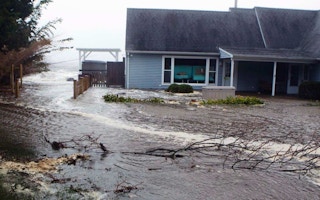Even if every country had a robust plan to adapt to climate change —which they do not—no amount of adaptation will be enough to protect people and property from some of the more serious impacts of climate change. Think of the vast damage that an extreme such as Superstorm Sandy can cause, or consider the certainty that some low-lying land will be forever submerged beneath rising seas by the end of this century.
In such cases, loss and damage carries both human and economic costs. And while the human costs can never be repaid, the economic ones can. The question then is: who should pay?
Given that many of the economic impacts of climate change will fall upon the countries and communities that have done least to cause the problem, it might seem obvious that those responsible for creating climate change should foot the bill.
While this principle – that victims can seek recompense from those who have harmed them — is central to the law of most countries, it remains a politically contentious topic in the international context of climate change.
Towards international rules
At the international negotiations under the UN Framework Convention on Climate Change, rich countries – led by the United States – have wanted to prevent any discussion of the topic. Meanwhile the developing nations – led by the small island developing states and the least developed countries have argued for an international mechanism that would compensate countries that suffer loss and damage.
“
Rich countries know that there is a room there called “liability”, which leads to another room called “compensation”. They are afraid of ending up in that room, and so have tried to prevent anyone from even entering the house.
After very strongly contested negotiations at the last conference of parties to the UNFCCC in Doha, Qatar, last year, the international community decided at last to examine options for such a mechanism. As the different parties to the convention get ready for the next conference, in Warsaw in November this year, they must get ready to discuss loss and damage again in a more substantive way.
Recent international and regional meetings have explored ways forward. At one such meeting, which the Asia Pacific Adaptation Network held in Bangkok in August,more than one hundred experts met to discuss the scientific aspects of the issue with support from the government of Japan. They identified research questions and areas in which researchers from developed and developing countries could collaborate. But more science is only part of the solution. We also need a political response and a new era in climate change diplomacy, that of global solidarity.
A house with many rooms
In my keynote address to the meeting in Bangkok, I said that in the context of the UNFCCC, the issue of loss and damage is like a house with many rooms. The poor countries want to go in and explore those rooms but the rich countries don’t want to enter the house.
This is because the rich countries know that there is a room there called “liability”, which leads to another room called “compensation”. They are afraid of ending up in that room, and so have tried to prevent anyone from even entering the house.
But the rich should not be scared of this house. It has many other rooms with names like “research to minimise losses”, “sharing knowledge”, “insurance”, “risk retention” and “solidarity payments”. Moreover, the rooms called “liability” and “compensation” are behind a big door labelled “attribution”, and that door is locked shut.
This is because it is impossible to say yet which floods or hurricanes and other disasters are due to the climate change human activities have created, and which would have happened anyway. The key to that door has not yet been forged. Its blacksmiths are the scientific community, and while they may be able to make that key in the future, it is not available yet.
As the rich nations prepare for the Warsaw negotiations, they should not let their fear of what lies behind that door get in the way of action on loss of damage in the other rooms, which ultimately will diminish that which they fear the most.
Saleemul Huq is the director of the International Centre for Climate Change and Development at the Independent University, Bangladesh. This post was sourced here and was first published by Responding to Climate Change on 4 September 2013.

















